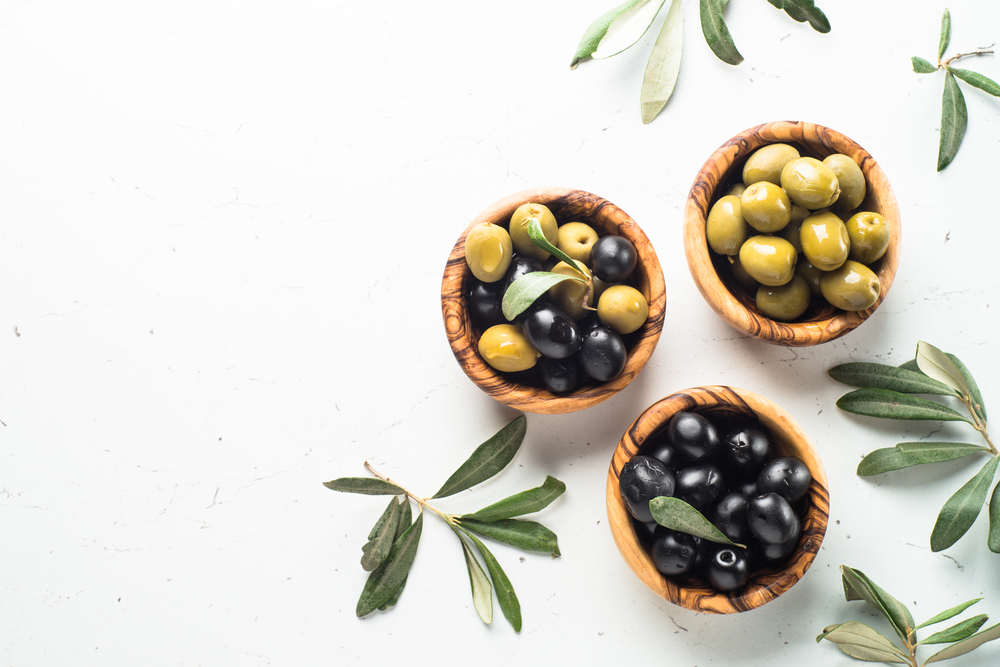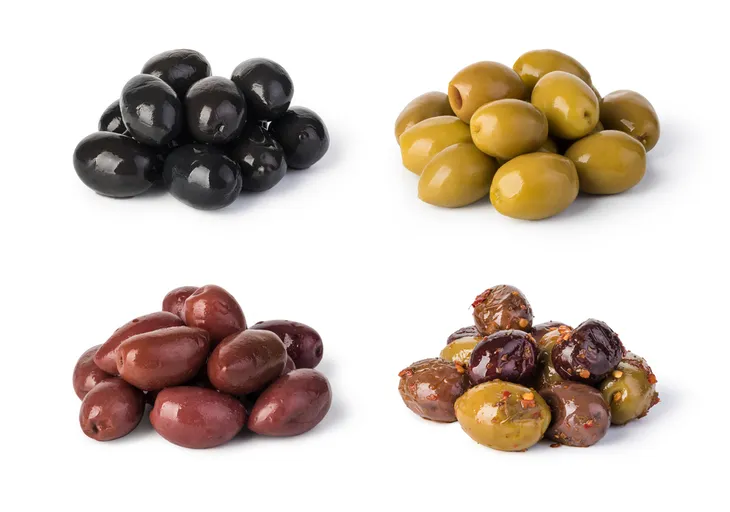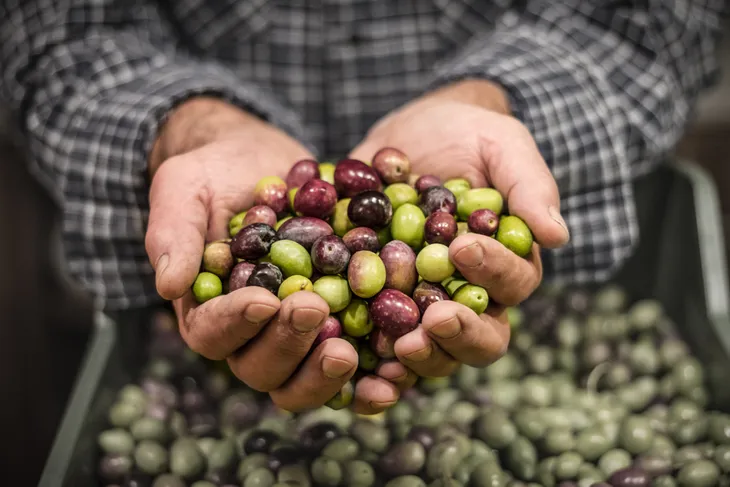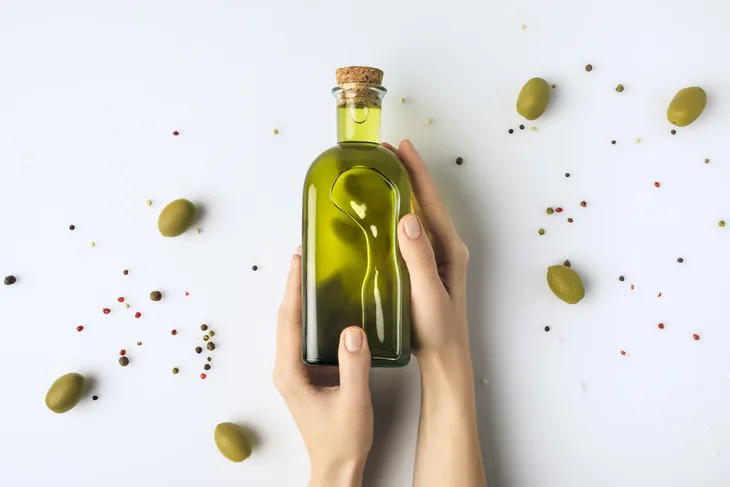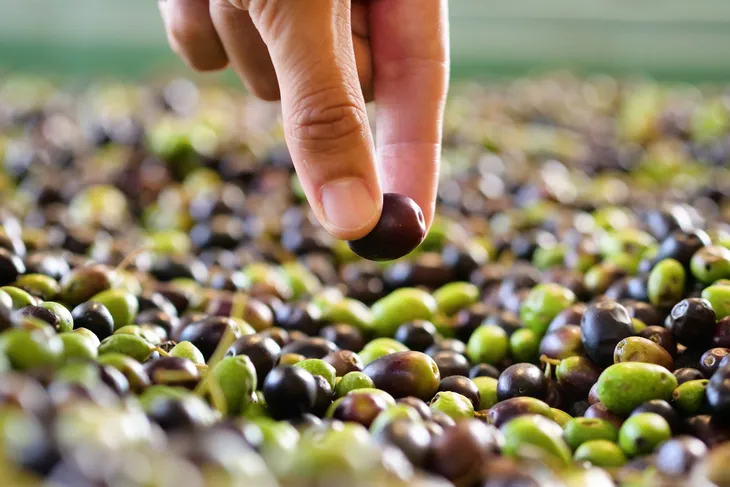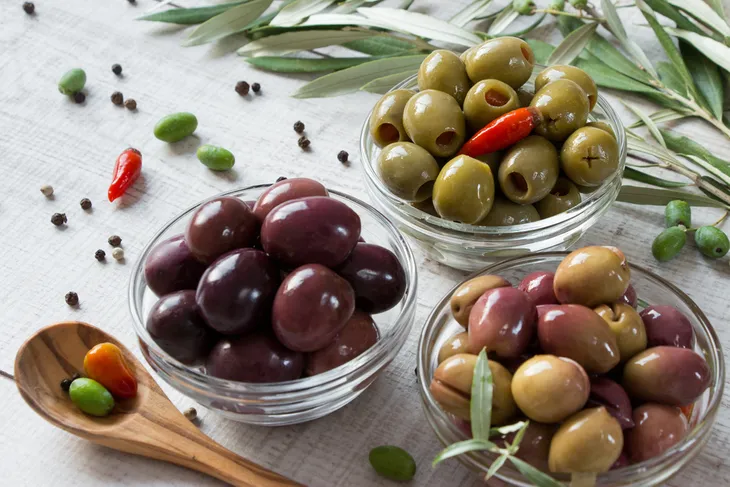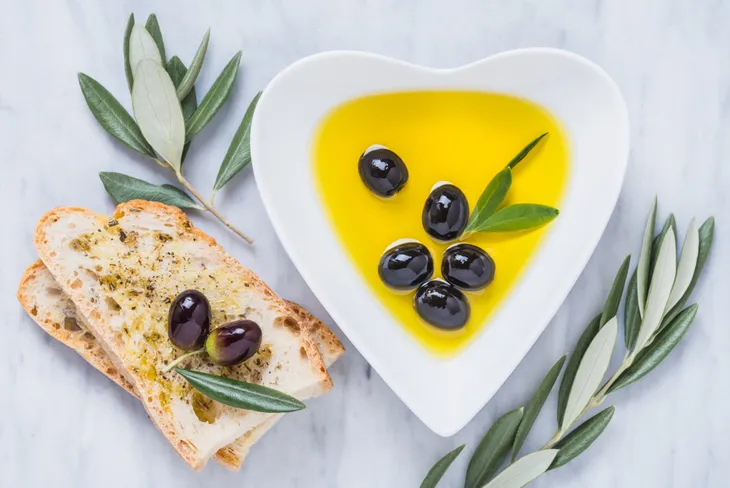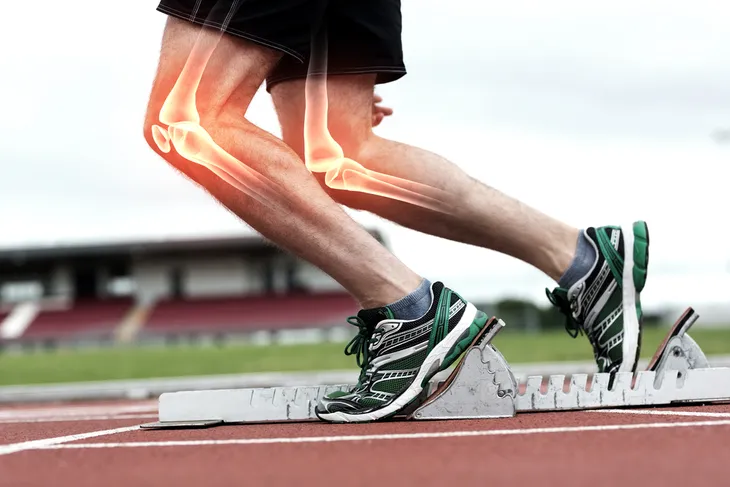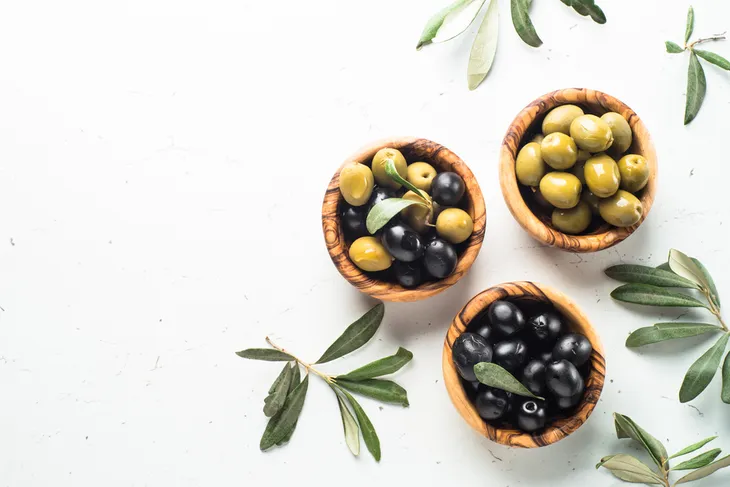Olives are one of those foods that you either love them, or you hate them. I happen to love olives, especially on pizza! Lucky for me, this little fruit that grows on olive trees has some really amazing health benefits. Even though they are small, they’re loaded with tons of powerful antioxidants and vitamins which give them the power to possibly prevent cancer, improve heart health, and protect us from chronic diseases and conditions like osteoporosis.
Let’s take a look at some more of the incredible health benefits of olives…
Help Reduce Pain
Olives can be as effective as ibuprofen by reducing pain with the compound oleocanthal which has anti-inflammatory properties. Chatelaine says “olive oil naturally reduces the pain of chronic inflammatory diseases such as arthritis and can be added to a daily diet to aid in pain reduction.”
Boost Iron Intake
Low iron is a common problem, especially for women. The best way to combat this is by eating foods that are rich in iron, like olives! According to SF Gate, you can get 3-milligrams of iron per 100-gram serving. This offers a great boost when it comes to chipping away at the daily recommended amount of iron which is 8-milligrams for men and 18-milligrams for women.
Chatelaine explains why iron is so important for our body. Iron is a “key factor in the formation of hemoglobin, the protein that carries oxygen throughout the body via the bloodstream. Iron also helps to build the enzymes responsible for regulating immune function and cognitive development.”
The source also advises taking the time to ensure the olive oil you’re buying is real in order to actually reap these benefits.
Good Source of Antioxidants
We are all encouraged to eat healthy foods that contain lots of antioxidants because dietary antioxidants can help reduce the risk of chronic diseases and cancer. “Olives are rich in antioxidants, with health benefits ranging from fighting inflammation to reducing the growth of unwanted microorganisms,” writes Healthline.
The source then goes on to reference a study which showed that the residue on olives can increase “blood levels of glutathione” which is a powerful antioxidant in the body. Another study showed that the antioxidants in olives can help fight the bacteria that causes infections in our airway and stomach.
May Help Prevent Cancer
Cancer is something that scares us all because it has affected so many people. Luckily there are things we can do to try to prevent it. Eating more olives and olive oil is one of those things that we can consciously do to protect ourselves against colon, breast and skin cancer. This is because they “contain an abundance of phenolic antioxidants as well as the anti-cancer compounds squalene and terpenoid. They also contain high levels of the monounsaturated fatty acid, oleic acid, which reduces excessive inflammation,” writes Chatelaine.
It actually works! Think of it this way…olives and the use of olive oil is extremely common in the Mediterranean region which just happens to have a lower cancer rate than other areas like European and American countries, says Healthline. The source cites research from test-tube studies which showed that olives antioxidant and oleic acid content is “able to disrupt the life cycle of cancer cells in the breast, colon and stomach.”
Protect Against Ulcers
Olives and olive oil are able to combat and protect against ulcers due to antimicrobial properties which fight the bacteria that causes stomach ulcers. “Studies have shown their high levels of polyphenols protect against eight strains of ulcer-causing bacteria, three of which are resistant to some antibiotics,” writes Chatelaine.
Improve Heart Health
Black olives especially are good for heart health because they contain monounsaturated fats, says SF Gate. In fact, the source adds that one ripe olive contains 8-grams of monounsaturated fats. According to the American Heart Association, the majority of fats we eat in a day should come from either monounsaturated or polyunsaturated fats and they should not amount to more than 25 to 30-percent of the calories eaten in a day.
“Monounsaturated fats can help reduce bad cholesterol levels in your blood and lower your risk of heart disease and stroke. Monounsaturated fatty acids may also benefit [glucose] levels and blood sugar control,” writes SF Gate.
Healthline adds to this by pointing out that high cholesterol and blood pressure are huge risk factors for heart disease and that the oleic acid (the main fatty acid in olives) has shown to “regulate cholesterol levels and protect the LDL-cholesterol from oxidation.” There are also studies that show olive sand olive oil are able to reduce blood pressure, says the source.
Maintain Good Eye Health
The best foods for eye health are those that contain vitamin A. This antioxidant is known for protecting the cornea and maintaining overall eye health, says MindBodyGreen. “It can help fend off age-related eye problems such as macular degeneration, cataracts, and glaucoma,” writes the source.
It doesn’t stop there! Olives also contain vitamin E and the antioxidant compounds lutein and zeaxanthin which all offer even more benefits for our eyes.
Anti-Inflammatory Benefits
Olives can help reduce inflammation which is what makes them great for pain reduction, as we previously mentioned. This little fruit contains polyphenols which is what allows them to stop organ tissue damage before it happens, explains Good Housekeeping.
“Working them into your regular dietary repertoire will give your body more access to polyphenols, in particular, oleuropein, a chemical compound known for its powerful antioxidant, anti-atherogenic, anti-inflammatory, antifungal, and antimicrobial properties,” writes MindBodyGreen.
Improve Brain Health
We’ve already talked about how olives can reduce inflammation which is great for managing pain. It’s also good for our brains! Olives can help reduce “oxidative stress caused by inflammation, they also protect the tissues of vital organs (i.e. the brain!) from harmful and potentially irreversible damage,” writes Good Housekeeping.
They also contain vitamin E which is not only good for our eyes, but it’s been linked to “improved cognition and reduced risk of cognitive decline.” Diets that use a lot of olive oil as their main source of fat, like the Mediterranean diet, have been shown to lower a person’s risk of Alzheimer’s disease.
Support Strong Bones
Remember when we said olives can protect us against osteoporosis? Well, now we’re gonna back that claim up! Healthline explains that osteoporosis is when our bone mass and quality decreases which puts us at a higher risk for fractures and breaks. Similar to cancer rates, Mediterranean countries have lower rates of osteoporosis than other parts of Europe which leads experts to believe that it has something to do with their diet.
The source also goes on to cite animal studies which have shown that “plant compounds found in olives and olive oil [can] help prevent bone loss,” writes Healthline. While there aren’t many human studies to further back this up, the data between the Mediterranean diet and osteoporosis rates are reassuring.
Help with Weight Loss
Olives are a good snack for those who are looking to lose weight because they’re low in calories. According to SF Gate, four large olives only amounts to 20-calories and 2-grams of heart-healthy fat. Just remember they are high in sodium because they are cured in brine, so the source suggests rinsing them as you would canned beans to make them healthier.
MindBodyGreen also adds that monounsaturated fats that olives contain have been linked to reducing belly fat and improving glucose sensitivity. If you’re trying to limit how much you eat, try eating a few olives before lunch or dinner because the “monounsaturated fatty acids (plus a bit of fiber) in the olives will help aid digestion and stimulate satiety hormones — so you’ll feel fuller sooner,” says the source.
Boost Energy
You might have noticed after eating a fatty meal that you’re more tired than you would be if you ate say, a salad. That’s because the food we eat is like fuel for our body. It’s supposed to provide us with energy. According to MindBodyGreen, the best food to eat is the kind that increases our glutathione levels, like olives.
A study published in the Journal of Agricultural and Food Chemistry found that olives can increase glutathione levels. “Glutathione is essential to energy production, so getting enough of the stuff can be the difference between a vibrant, active life and one that’s anything but,” says MindBodyGreen. (Check out this article on Foods Proven to Boost Energy).
May Improve Blood Sugar
Olives are a great snack for diabetics because they can help improve blood sugar. Good Housekeeping says that a person can consume extra virgin olive oil two hours after a meal to help regulate their blood sugar levels.
Popping in a few olives can also help too because they contain polyphenols. “Research indicates diets high in monounsaturated fats and antioxidants may lessen the risk of type II diabetes,” writes the source.
Good for Digestion
You’ve probably heard that fiber is good for us because it helps things…move along so to speak. Well according to SF Gate, black olives are a great source of dietary fiber. The daily recommended amount of fiber is 38-grams for men and 25-grams for women. Luckily, a 100-gram serving of olives adds up to about 3-grams of dietary fiber, says the source. “Soluble fiber can help lower blood cholesterol and glucose levels, while insoluble fiber adds bulk to your stool and promotes the movement of material through your digestive system.”
